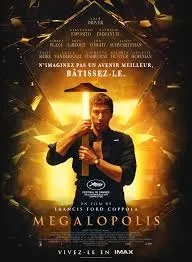Megalopolis – "The City of Nothingness"
Julia is torn between the conservative vision of her father, the mayor of New Rome, and the utopian ideals of her lover.
Admittedly, I borrowed a synopsis from Wikipedia, but it hardly does justice to the narrative's complexity. The heavy-handed allegory and ambitiously rich themes didn’t bother me. The parallel between ancient Rome and New York is quite evident: nothing has changed—*panem et circenses* is as relevant as ever. The work is a true cacophony, dense, and chaotic, straight from the boundless imagination of an octogenarian filmmaker. It’s an oxymoronic film blending the genres of *peplum* and futuristic. In short, it’s a megalomaniacal yet stunningly visionary film, positively astonishing and leaving you pleasantly bewildered.

The Boy and the Heron – "Do you want to return to a stupid world where people kill and rob each other?"
“A grey heron told me: ‘all grey herons lie.’ Is that true or is it a lie?”
Mahito encounters a cryptic heron claiming that his recently deceased mother is still alive.
The metaphors are excessively convoluted, even cryptic—many of them completely eluded me. The characters are too dull and monotonous to engage, an unusual departure from the filmmaker’s previous works, especially given the typically vibrant female protagonists. Additionally, the proliferation of locations left me entirely lost. However, the octogenarian auteur still demonstrates an incredibly fertile imagination.

A Different Man – "I Always Recognize a Face"
Formerly afflicted with neurofibromatosis, a condition that severely disfigures the face, Edward undergoes surgery to gain a pleasing appearance; he becomes obsessed with an actor portraying him.
This unique fable critiques the societal obsession—if not tyranny—of beauty. The film raises ethical questions about casting a performer without the protagonist's affliction, unlike Adam Pearson, in a subtle meta-commentary. In public spaces like the streets and subway, the protagonist feels immense discomfort under the gaze of others—or their averted eyes. The corporate video within the film is a gem of dark humor. Overall, it’s an ironic and satirical take on Beauty and the Beast. A work that deserved far more publicity and recognition.




Comments (0)